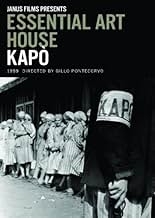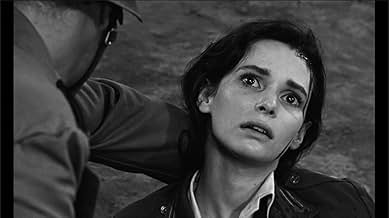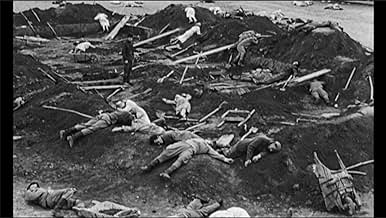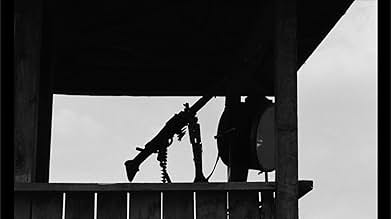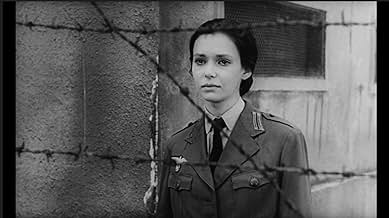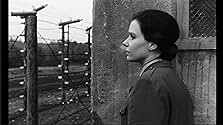IMDb-BEWERTUNG
7,6/10
2839
IHRE BEWERTUNG
Ein junges jüdisches Mädchen unternimmt einen Fluchtversuch aus einem Konzentrationslager.Ein junges jüdisches Mädchen unternimmt einen Fluchtversuch aus einem Konzentrationslager.Ein junges jüdisches Mädchen unternimmt einen Fluchtversuch aus einem Konzentrationslager.
- Für 1 Oscar nominiert
- 3 Gewinne & 4 Nominierungen insgesamt
Semka Sokolovic-Bertok
- Une detenuta
- (as Semca Sokolovic)
Dirjana Dojic
- Ninette
- (as Dirjana Dojc)
Graziella Durano
- Une detenuta
- (Nicht genannt)
Sima Janicijevic
- Il medico di Auschwitz
- (Nicht genannt)
Rastislav Jovic
- Yanko Milovich
- (Nicht genannt)
Dusan Perkovic
- Il commandante tedesco
- (Nicht genannt)
Empfohlene Bewertungen
If somebody would like to see what was a nazi prison, one has to see this movies. It showed with realism the nature of cruelty by nazis and the ways they used some of their prisoners to watch the movement of the rest and to combat effectively any possible plot against them. Pontecorvo is a director with a few films, but all of them always show real facts of the history, and this film is not an exception
Edith is a Jewish teen whose family is among those loaded onto boxcars and shipped to Auschwitz. This is a story of brutality and Susan Strasberg ("Picnic") plays the central character who struggles to survive the Nazi holocaust machine.
Shot in black and white, of course, the film provides a stark and nearly unrelenting look at the depravity, deprivations, and degradations found in concentration camps. Strasberg is strong in her role, embodying the chameleon-like ability to change that gives her character a chance to survive, though survival has its price.
The action feels real, the locations feel real, and real emotions are evoked by this ambitious attempt to delve into the real human costs of barbarism---the loss of principles, the corruption of dignity, and the subtle shadings of resistance.
The Italian producers of this film pursued Strasberg for this role, somehow knowing that she had the depth within her to bring Edith to life on the screen. Her father, Lee, recommended she accept the role. Luckily, she did.
Shot in black and white, of course, the film provides a stark and nearly unrelenting look at the depravity, deprivations, and degradations found in concentration camps. Strasberg is strong in her role, embodying the chameleon-like ability to change that gives her character a chance to survive, though survival has its price.
The action feels real, the locations feel real, and real emotions are evoked by this ambitious attempt to delve into the real human costs of barbarism---the loss of principles, the corruption of dignity, and the subtle shadings of resistance.
The Italian producers of this film pursued Strasberg for this role, somehow knowing that she had the depth within her to bring Edith to life on the screen. Her father, Lee, recommended she accept the role. Luckily, she did.
Although it features two French leads (Laurent Terzieff and Emmanuelle Riva) ,"Kapo" has disappeared from the French dictionaries of films whereas lots of duds are included.
With the exceptions of "Nuit et Brouillard" (which was an exceptional documentary ) and Wanda Jakubowska 's "ostatni etap' (1947) there were few movies which at the time broached the concentration camps subject(the last scenes of Dmytryk's "young lions" ,1958)
Susan Strasberg was impressive ,mainly in the first hour though the evolution of her character is not always believable.Besides,her relationship with Sascha weakens the plot .
Emmanuelle Riva almost outshines Strasberg,maybe because she was a more experimented actress (she was featured in Resnais's "Hiroshima Mon Amour" ) and her scene when she is translating the German words in a voice chocked with emotion may be the strongest in the whole movie.
The "potato" scene is also revealing.I remember what Simone Veil ,a former French minister (secretary) (and herself a former prisoner in a concentration camp),said after watching the last episode of "Holocaust " (the seventies miniseries) : "in the camps ,people were not as helpful ,as kind ,as compassionate as they are in the film" ."Kapo" shows a very harsh world where the women are almost always fighting against their mates:that's the story of Edith /Nicole .
When it was released ,the movie was trashed by Jacques Rivette because of a tracking after Riva 's death ;at the time Nouvelle vague= intellectual dictatorship.Although defended by the Italian masters (including Visconti),the movie was cursed .The IMDb users have restored it to favor.
With the exceptions of "Nuit et Brouillard" (which was an exceptional documentary ) and Wanda Jakubowska 's "ostatni etap' (1947) there were few movies which at the time broached the concentration camps subject(the last scenes of Dmytryk's "young lions" ,1958)
Susan Strasberg was impressive ,mainly in the first hour though the evolution of her character is not always believable.Besides,her relationship with Sascha weakens the plot .
Emmanuelle Riva almost outshines Strasberg,maybe because she was a more experimented actress (she was featured in Resnais's "Hiroshima Mon Amour" ) and her scene when she is translating the German words in a voice chocked with emotion may be the strongest in the whole movie.
The "potato" scene is also revealing.I remember what Simone Veil ,a former French minister (secretary) (and herself a former prisoner in a concentration camp),said after watching the last episode of "Holocaust " (the seventies miniseries) : "in the camps ,people were not as helpful ,as kind ,as compassionate as they are in the film" ."Kapo" shows a very harsh world where the women are almost always fighting against their mates:that's the story of Edith /Nicole .
When it was released ,the movie was trashed by Jacques Rivette because of a tracking after Riva 's death ;at the time Nouvelle vague= intellectual dictatorship.Although defended by the Italian masters (including Visconti),the movie was cursed .The IMDb users have restored it to favor.
I was not previously aware of this gem. I found it on TCM after it had already been on for about 10 minutes. I kept thinking that the lead actress looked just like SUSAN STRASBERG & for good reason. It was. The fact that it was foreign with sub-titles threw me initially. Very realistic, almost raw, which was surprising considering that this movie was made in 1959.
STRASBERG as 'Nicole' works her way up through a concentration camp to become the woman in charge of her fellow prisoners. Strong language, violent situations, but this is a story about WWII, not the 'Enchanted Forest'. Good storyline, good direction, & a terrific performance by SUSAN STRASBERG that was all the more admirable when you realize that she was all of 20,21 when she made this.
STRASBERG as 'Nicole' works her way up through a concentration camp to become the woman in charge of her fellow prisoners. Strong language, violent situations, but this is a story about WWII, not the 'Enchanted Forest'. Good storyline, good direction, & a terrific performance by SUSAN STRASBERG that was all the more admirable when you realize that she was all of 20,21 when she made this.
This Italian film, following the travails of a young Jewish girl in a Nazi work camp, is successful due mainly to its realistic sets, and the performances of Strasberg and Terzieff. Supporting cast members also shine throughout the film. The whole concept of the "kapo" is new to me, and it added a further dimension to the horrific Nazi experience not covered in films such as "Sophie's Choice" and "The Pianist." Deservedly, it was nominated for an Academy Award (Best Foreign Language Film) in 1960. Strangely enough, most filmographies of Strasberg fail to highlight her incredible performance in this film. Certainly, it must have reflected her performance as Anne Frank on Broadway. The same year as "Kapo," George Stevens released his film version of "Anne Frank," starring Millie Perkins, who took the role once Audrey Hepburn turned it down. Certainly, Strasberg must have been considered.
A "kapo" was a prisoner of a concentration camp that watched over the other prisoners in a specified group. A kapo received better clothing, food, and was not required to work. 2001's "The Grey Zone" would be an appropriate double-feature with this film.
A "kapo" was a prisoner of a concentration camp that watched over the other prisoners in a specified group. A kapo received better clothing, food, and was not required to work. 2001's "The Grey Zone" would be an appropriate double-feature with this film.
Wusstest du schon
- WissenswertesThe producers imposed a romance line in the story and also another ending, different from the one Pontecorvo, the director, wished to shoot.
- PatzerIn the opening scene, Edith walks past some shops on her way back home. One of the shops look like it belongs to the booming 1950s than the more austere WWII period. There is a toy car or baby push car in the store window that shows the typical car design of the 1950s.
- Zitate
Edith, alias Nicole Niepas: [to Sasha] Your mother won't like me, I'm not a good girl, and my name's not Nicole, I'm a Jew.
- VerbindungenFeatured in Pontecorvo: The Dictatorship of Truth (1992)
Top-Auswahl
Melde dich zum Bewerten an und greife auf die Watchlist für personalisierte Empfehlungen zu.
- How long is Kapo?Powered by Alexa
Details
- Laufzeit
- 1 Std. 57 Min.(117 min)
- Farbe
- Sound-Mix
- Seitenverhältnis
- 1.66 : 1
Zu dieser Seite beitragen
Bearbeitung vorschlagen oder fehlenden Inhalt hinzufügen


